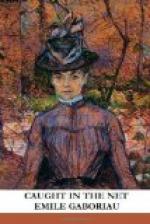Daddy Tantaine, after leaving the doctor’s, soon arrived at the residence of M. Perpignan, and rang the bell.
A fat woman answered the door. “M. Perpignan is out,” said she.
“When will he be back?”
“Some time this evening.”
“Can you tell me where I can find him, as it is of the utmost importance to both of us that I should see him at once?”
“He did not say where he was going to.”
“Perhaps he is at the factory,” said Tantaine blandly.
The fat woman was utterly taken aback by this suggestion. “What do you know about that?” faltered she.
“You see I do know, and that is sufficient for you. Come, is he there?”
“I think so.”
“Thank you, I will call on him then. An awfully long journey,” muttered Tantaine, as he turned away; “but, perhaps, if I catch the worthy man in the midst of all his little business affairs, he will be more free in his language, and not so guarded in his actual admissions.”
The old man went to his task with a will. He passed down the Rue Toumenon, skirted the Luxemburg, and made his way into the Rue Guy Lussac; from thence he walked down the Rue Mouffetard, and thence direct into one of those crooked lanes which run between the Gobelins Factory and the Hopital de l’Oursine. This is a portion of the city utterly unknown to the greater number of Parisians. The streets are narrow and hardly afford room for vehicles. A valley forms the centre of the place, down which runs a muddy, sluggish stream, the banks of which are densely crowded with tanyards and iron works. On the one side of this valley is the busy Rue Mouffetard, and on the other one of the outer boulevards, while a long line of sickly-looking poplars mark the course of the semi-stagnant stream. Tantaine seemed to know the quarter well, and went on until he reached the Champs des Alouettes. Then, with a sigh of satisfaction, he halted before a large, three-storied house, standing on a piece of ground surrounded by a mouldering wooden fence. The aspect of the house had something sinister and gloomy about it, and for a moment Tantaine paused as if he could not make up his mind to enter it; but at last he did so. The interior was as dingy and dilapidated as the outside. There were two rooms on the ground floor, one of which was strewn with straw, with a few filthy-looking quilts and blankets spread over it. The next room was fitted up as a kitchen; in the centre was a long table composed of boards placed on trestles, and a dirty-looking woman with her head enveloped in a coarse red handkerchief, and grasping a big wooden spoon, was stirring the contents of a large pot in which some terrible-looking ingredients were cooking. On a small bed in a corner lay a little boy. Every now and then a shiver convulsed his frame, his face was deadly pale, and his hands almost transparent, while his great black eyes glittered with the wild delirium of fever. Sometimes he would give a deep groan, and then the old beldame would turn angrily and threaten to strike him with her wooden spoon.




